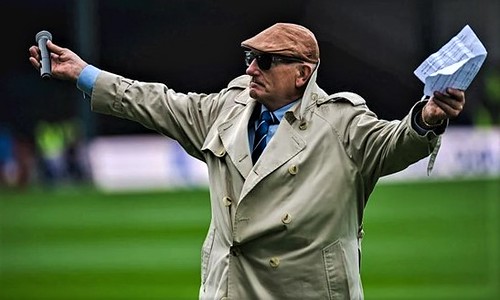
Whisper it, but there’s a buzz around Boundary Park. Oldham Athletic are on their way back. A year and a half after dropping out of the Football League, with talk of extinction, the club currently sit sixth in the National League and promotion is on every fan’s lips.
It’s been eighteen months since Frank Rothwell took ownership of the club and declared ‘the pain was over’ for the Greater Manchester club.
The club had been going through a tumultuous time under previous owner, Abdallah Lemsagam, which saw fan protests and The Latics becoming the first former Premier League club to lose their league status.
Off-the-field issues like late wage payments and multiple managerial changes contributed to a downturn in form – and the inevitable pushback from fans.

One of the key figures in the fan protest movement was Matt Dean, now Director of the Oldham Athletic Supporters Foundation.
“I came into the Supporters Foundation a couple years ago off the back of a podcast called The Boundary Park Alert System. We were very much involved in telling the story of what was going wrong at Oldham with the previous owners.”
Dean is eager for lessons to be learned from what almost happened to Oldham:
“I think it’s money coming into the game needs to be distributed a lot more evenly throughout the football pyramid. Custodians of football clubs should be properly vetted. Football clubs should be brought under heritage and legal protection because it’s just too easy for people to come in and ruin clubs.”
The Foundation now own 3% of Oldham Athletic and Dean says life is looking much more positive under Rothwell and fan ownership. The priority now is a bit more stability.
“There’s a lot of work to do. You can’t just flick from something that is broken to something that is fixed. You have to kind of figure out what has gone wrong in the past and try not to repeat the same mistakes.”
As a lifelong fan, Dean understands the need for the club to reflect the fans and the community that surrounds it.
“Now we’re in a different position to set ourselves up as a community that benefits society” says Dean. “And we’re trying to change what we do.”
Relegation to the National League in 2022 ended 116 proud years which saw the club become founder members of the Premier League, League Cup finalists in 1990 and Wembley FA Cup semi-finalists in 1994. The average attendance at Boundary Park in 1992 was over 15,000.
By 2020 support had fallen away significantly, with an average attendance of under 3,500. Now the average crowd is well over 6,000 – the highest for any season since 2007.
“Our new motto is to invest in the club, in the town, and in the community. We want to increase the fan membership beyond 3%, to the point where we have more influence and more say.”
Dean believes that it was that sense of community which has seen Oldham survive while other local sides including Bury and Macclesfield have collapsed.

“Bury going was a tragedy, I hope that they get back to the Football League. Despite being in the shadow of United and City, when a club like Oldham does well, the people of Oldham will be attracted to it. We’re still a big town, and we’ve still got a wide-reaching fanbase.”
Those fans have been inspired by Frank Rothwell’s efforts away from the boardroom too. The 70-year-old is currently rowing the Atlantic Ocean, with the hope of raising £1,000,000 for Alzheimer’s Research UK.
“For the last 25 years, we’ve had no real charismatic leadership. And then we bring in someone like Frank, somebody who goes out and does things and inspires people, saying ‘anything is possible’. That is a metaphor for what we want to do with this club.”
Oldham Athletics’ next home game against Kidderminster Harriers on February 24 will be Rothwell’s first since his transatlantic voyage. And his returning gift is to knock ticket prices down to £1.
